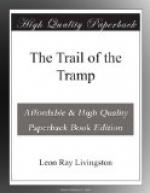Joe and Jim realized that it would have been an impossibility for them to wring from their mother her consent to let them try their luck in the city, for since their father’s death, they had become her moral support. They felt ashamed to be loafing idly about the reservation until school opened again and have their widowed mother support them, as they were now sixteen years of age, and more than able to support not only themselves, but could and would gladly have supported her had an opportunity been offered them. The more they argued the matter between themselves, the more they became resolved to journey to some city, and at least until the time came for them to be on hand at school opening, make their own way and perhaps their fortune, which seemed to them within easy reach. They had saved almost fifty dollars, which had been earned running errands and working as water-boys whenever an “extra” gang had been sent from the division point to assist their father’s crew in putting in a new culvert, building a new switch or doing other heavy work requiring more man-power then the reservation crew could supply. This money was kept in a small savings bank, to which they had easy access.
Their scheming and plotting had finally reached the point where it needed only the least provocation to cause them to skip, and this chance came to them one evening while the section crew was in their bunk house, and their mother and Donald, whom they had not taken into their confidence, were busy in the kitchen, when a long, eastbound freight train pulled in upon the siding to let the westbound passenger train pass it. The boys were lounging in the front yard and as the freight train slowly drew past them they espied some open, empty box cars, and as if driven by some strange impulse, they pressed each other’s hands and whispered that now “the time had come,” and then dashed up to their room, emptied the savings bank, packed their few necessities into small bundles and, carefully avoiding the rear of the section house where the kitchen was located, and keeping on the alert to prevent meeting or being seen by any of the section men or train crew, they ran down the side of the train, which was just pulling out of the siding, climbed—as they had so often seen hoboes do—into an empty box car, and slinking back into the darkness of its farthest corner, they were soon traveling beyond familiar landscape. Gradually they became accustomed to the jolting and rattling of their side-door Pullman and stretched themselves upon its hard floor and fell asleep.
It must have been almost morning when, as they stopped at the last water tank west of Grand Forks, they were aroused from their slumbers by the bright rays shed by a lighted lantern held in the hands of a brakeman who roughly shouted: “Which way, kids?” “To Saint Paul,” answered Joe. “Got some money, lads, with which you can square your ride?” inquired the railroad man, as he raised his lantern




